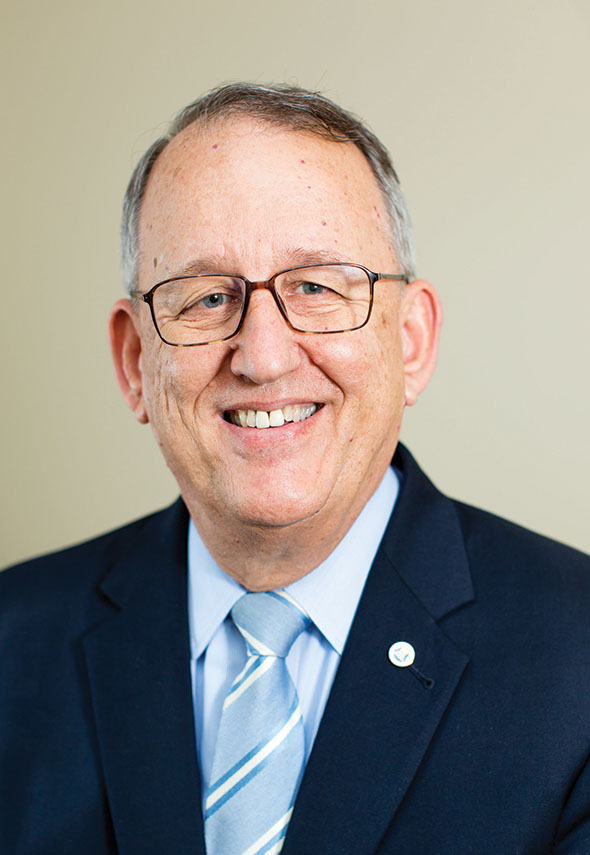Unprecedented?
Posted on Sept. 15, 2020
Douglas S. Dibbert ’70
Since Carolina moved to virtual instruction in March, the word “unprecedented” repeatedly has been used to describe the unfolding circumstances the University continues to face. A century ago, the University met another such challenge: While contributing to the nation’s efforts to end World War I, Carolina experienced the worldwide influenza epidemic that resulted in the loss of two of its chief executive officers within months. The Review, which was entering its sixth year in 1918, published the following reports; all back issues are available at
alumni.unc.edu/CARarchive.
October 1918
“The University is opening in a way so unusual that it is difficult to describe the many changes in detail, or to indicate the departures from former traditions. The catalogue has been discarded as a general guide to the entering students. The campus has become a government camp, the dormitories are barracks, the dining hall, a mess. The Y.M.C.A. has assumed the functions of a ‘Y’ hut, and the general program of the University conforms to strict military requirements. In all the change, however, one fact stands out clearly: the University is thoroughly aligned with those forces which have as their object the winning of the war, and to that end, along with the Students’ Army Training Corps of 400 or more colleges and universities, it is devoting its entire energy. Formerly its function has been to train men for professional and education activities. Its first duty now is to help bring the war to a speedy end and to prepare leaders for the reconstruction which will follow.
“For the first time in the history of the University the Senior class returns to the campus to find itself grouped according to the age of its members rather than to the number of years it has spent in college, and to be transferred from this military camp to others probably within the next three months … [E]very student … is a soldier under the direct command of Lieut. Col. G.W.S. Stevens and members of his military staff. The faculty, operating under the co-ordinate educational branch of the service, of which President McLauren, of Massachusetts Institute of Technology is Director and President [Edward Kidder] Graham, Regional Director for the South Atlantic States, has reorganized its work … and is offering courses in keeping with the purpose of the War Department. …
“October Twelfth … will find the ranks of the local alumni associations greatly depleted by members in service. But this should not deter the members who remain from planning for the annual meeting and carrying out a purposeful program. There is one special duty which should receive attention by all such meetings — the record of the members in service should be carefully compiled, and an accurate copy of it, together with a report of the meeting, should be sent to THE REVIEW.”
November 1918
“Edward Kidder Graham, seventh president of the University, died at his home … October 26th, after a brief illness of influenza followed by pneumonia. Although the serious nature of his condition was known by the University community, no one was prepared for the sudden ending of his brilliant career, which left the village, faculty, and student body overwhelmed with grief and brought the sense of keen personal loss to thousands of alumni and friends throughout the nation. …
“At a meeting of the Executive Committee of the Board of Trustees held Thursday, October 31st … Professor M.H. Stacy, Dean of the College of Liberal Arts, was appointed Chairman of the Faculty with power to perform the duties of the office of president of the University, made vacant by the death of President Graham. …
“The University has just passed through an epidemic easily the most
dangerous it has ever experienced and which before its passing took four lives as its toll from the campus and two from the ranks of those who ministered to the stricken at the Infirmary out of a total of more than 300 cases, 18 of which were
followed by pneumonia. …
“Contrary to all previous precedents, no celebration of the 125th anniversary of the University was held on October 12th. The classes did not form in front of the Alumni Building. The band was silent. Kodakers did not appear. The long column did not file past New West and lose itself in the vastness of Memorial (now Armory) Hall. The influenza epidemic upon the campus forbade public assemblages.”
February 1919
“Marvin Hendrix Stacy, instructor, professor, dean of the College of Liberal Arts for the past five years and chairman of the University faculty since the passing of the late President Graham last October, died at his home on Tuesday, January 21, from influenza and complications, following an illness of eight days. …
“At the meeting of the Board of Trustees in Raleigh on January 28th, Dr. H.W. Chase, Professor of the Philosophy of Education from 1910 to 1914, and of Psychology from 1914 to date, was appointed chairman of the faculty to fill the vacancy caused by the death of Chairman of the Faculty Stacy.”
June 1919
“Close ranks, forward!
“This command, issued by the Trustees at their special meeting in Raleigh on June 16th in the election of Dr. Harry Woodburn Chase to the presidency, and most heartily received by faculty, student body, and alumni, brought to a fortunate close an unprecedentedly fateful and critical year in the history of the University, and gave confident assurance to the State that its chief educational institution though profoundly shocked by the loss of Graham [and] Stacy … and the confusion incident to the world war, had recovered its stride, and awaited, eager, strong, and united, the opportunity to enter the wider field of service which lies before it.”
Yours at Carolina,

Douglas S. Dibbert ’70
